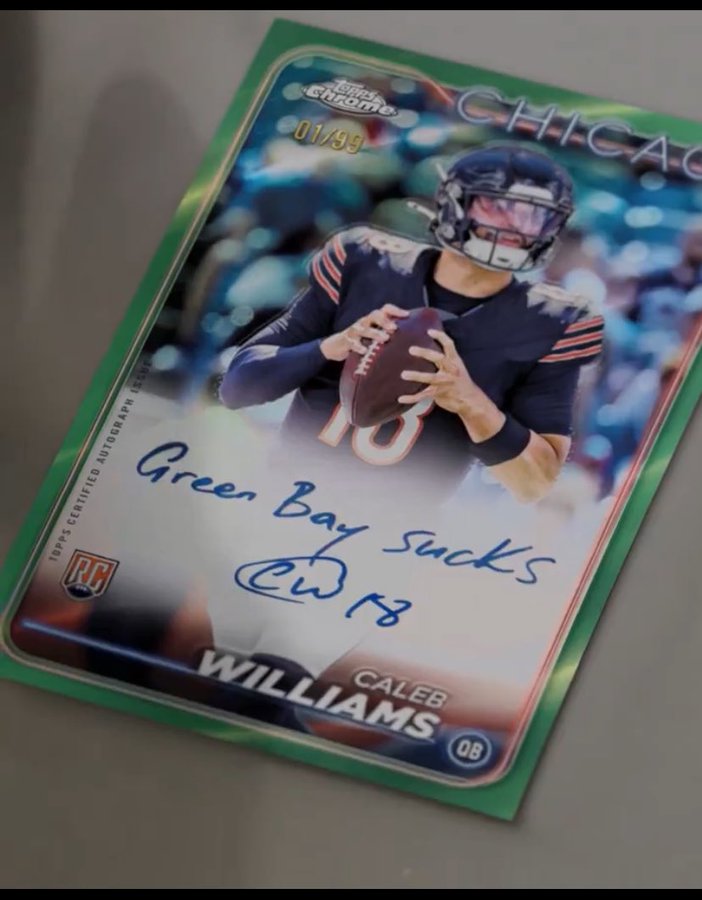
Rookie QB’s Cheeky Autograph Ignites Historic Bears-Packers Rivalry
In an era where social media antics and viral moments often become more memorable than the sporting events themselves, Caleb Williams, the fresh face at the quarterback helm for the Chicago Bears, has added a playful yet provocative twist to an age-old football rivalry. This audacious move came not during a tense postseason showdown or in a high-pressure pre-game interview but via a medium as glossy as it is nostalgic: a Topps Chrome Football trading card.
Dating back over a century, the Bears-Packers rivalry transcends the field, inhabiting the lore of bruising competitions and igniting fierce fandom encounters. From the days when George Halas and Vince Lombardi prowled the sidelines to more recent clashes starring Walter Payton and Brett Favre, this Midwestern onslaught has remained one of football’s most iconic tussles. Now, amid flashes of camera phones and fervent tweetstorms, Caleb Williams, with youthful bravado, has found his own method to etch himself into this storied feud.
Williams’ autograph, a deceptively simple act of signing on the dotted line, packs more than a signature; it carries a message potent enough to bridge the mediums of sports and culture. The inscription on select 2024 Topps Chrome Football cards—a straightforward “Green Bay Sucks”—is as divisive as it is delightful. Here is a duly inked declaration, challenging, taunting, and prodding a hornet’s nest of Packers pride.
This ribbing comes as no surprise to those familiar with the dynamics of sports rivalries. The Bears and Packers have a history wired with animosity and mutual respect. Yet Williams, not one to salivate in the routine light of press conferences and pre-draft podiums, chose an unusual battlefield—trading cards. The cards that were once mere static collectibles of heroes and legends now transform into canvases of controversial camaraderie and competition. What Williams has crafted is an artifact, a snappy soundbite wrapped in foil.
The market response to Williams’ cheeky dig at their northern adversaries? A classic showdown of supply and demand, sentiment and speculation. Bears fans are anticipated to swoop in, viewing these inscribed autographs not merely as memorabilia but as totems of their fandom. It’s a playfully irreverent stock investment where affinity and allegiance seal the deal.
The notarized nuisance also teeters on becoming a novel motivation for some Packers fans who might equal parts despise and desire this ephemera. Some will collect for the delight of dissent, for what’s a rivalry if not a celebration of an opposing ego? Others, perhaps privy to schadenfreude, will seek to purchase and obliterate these cards, akin to digital burning of flag videos that saturate tik-tok feeds following political protests.
So, these autographs—more electrifying message boards wrapped in cellophane than traditional commodities—threaten to upend market conventions. Initially, the demand will likely cause the prices to spike, with the potential for long-term valuation swaying on Williams’ career trajectory on the field. A stellar performance could see this card cherished—not just for bearing a rookie’s signature but as part of the enduring narrative of an athlete who seized the mantle of the rivalry with aplomb. Conversely, should Williams falter, the autograph’s aura may dim, serving instead as an anecdotal asterisk in the annals of trading card history.
Yet, trading cards in this modern era have transcended their roots. No longer are they mere reels that capture sports likenesses for the adoring kin of fans spanning coasts and continents. Now, they are capsules of culture and idols that partake in the global dialectic of sports and personality. They are codexes of competition’s culture clash, mid-game trash talk immortalized in a tangible, portable format. Williams, knowingly or not, captured not just a motto but a moment in time—an evergreen reminder of the mirthful sting professional sports can wield.
Topps Chrome, in all its lustrous sheen, has unwittingly doubled as an artist’s palette for the expression of rivalrous wit. As fans shuffle through packs and peer into foil wrappers, each card bearing Williams’ contentious quip becomes not just a capture of a moment but a piece of sporting theater—with fans as its fervent curators.
As the market raids for cards intensify and hobbyists lend earnest gazes to lightboxes and magnifiers, don’t miss the spectacle. Come for the cards, stay for the narrative. Who knew a rookie’s inscribed opinion could incite such passion, a duel not of muscle and play-calling but of pens in hand and wits afire? In this playful breach of the sporting norm, Caleb Williams has ensured that while the stats may occasionally blur and fade, the message—clear, crafted, and chrome-clad—echoes.